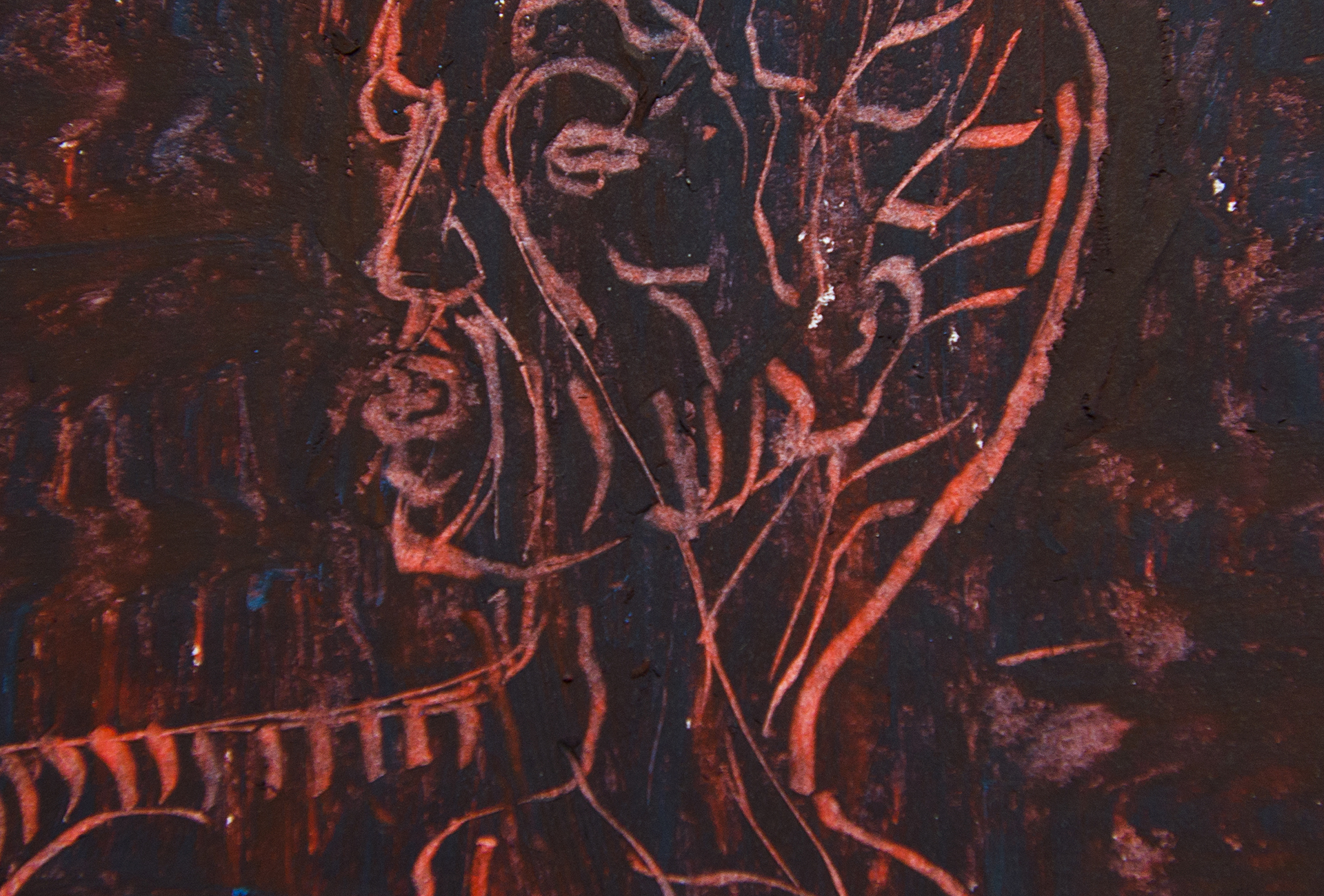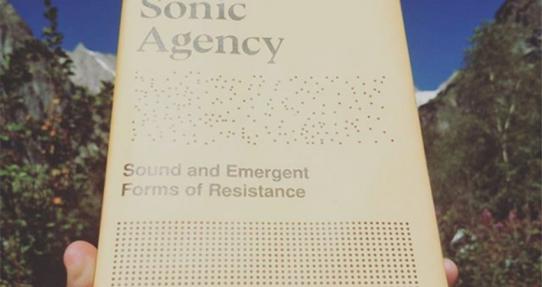26 Punto de Encuentro Festival: “On Vocal Agency”

The “Punto de Encuentro” Festival has been organized by the AMEE since 1990. This edition presents a series of workshops, talks and performances, in continuity with the “En Red” 10th Symposium held in 2018 in Medialab-Prado, focused on the subject of voice in poetry, cinema and experimental music.
The development of voice as an artistic research field brings up questions regarding the notion of ‘vocal agency’: a certain politics of voice, vocality and intervocality. This includes discussing and reflecting upon ways of speaking and how different uses and conceptions of voice favor certain political orientations, social classes, or forms of relationships in terms of modes or practices of listening.
Can the body of knowledge acquired through sound art practices, particularly that of the voice as a field of artistic experimentation, prove useful as a starting point to think about, or at least to evoke or attempt to evade, conditions of personal and political crisis? How can the voice articulate what Brandon LaBelle refers to as “emerging forms of resistance”? Raising these questions within the sound art field leads us to adopt ethical and agentive positions and tactics based particular sonic, spatial, verbal, and textual artistic experiences.
I.
Monday 25, Tuesday 26, and Wednesday 27 November
Vocal Dissidences: A Workshop with Florencia Curci
5–7 pm. Lab 0 as meeting point.
Disidencias vocales [Vocal Dissidences] is a workshop exploring the potentialities of our phonetic apparatus according to notions and uses that undermine domination structures in the discursive field. Which body constructs which voice? Which rhythms construct which vocalities, which bodies, which communication, which community? The workshop does not intend to answer these questions, but instead concentrates on the processes of subjectivation involved, on how the voice moves through and between bodies, defining their surfaces and determining their movements.
The workshop proposes listening and vocal exercises based on sonic meditation, breath control, repetition of slogans, and hauntology, favoring a critical approach to the tensions between rational and visceral discursiveness, between the objective and the incarnated voice. The phenomenon of auditory verbal hallucinations or ventriloquy is treated as particular cases of dislocation of intentionality and possession of discourse, incorporating the use of technologies of amplification, processing and spatialization of the voice as medium to transmit what needs to be heard.
The workshop is free of charge and requires prior registration. Places are limited.
On Sonic Agency: A Workshop with Brandon LaBelle
7–9 pm. Lab 0 as meeting point.
The workshop On Sonic Agency aims to reflect upon acoustics as a framework that, by lending to the shaping of social and spatial environments, greatly impacts onto experiences of belonging and unbelonging. Extending from Jacques Rancière’s notion of “the distribution of the sensible”, we’ll consider how communities rework “the distribution of the heard” by intervening onto a dominant acoustic. This includes reflecting upon different forms of acoustic practices, from self-organized dance clubs to silent protests conducted against economic injustices to fostering affective economies of domestic life.
In this sense, the workshop will focus less on the making of sound and more on engaging with sonic agency as a creative method. This will lead to reflections on our experiences of hearing and being heard, attunement and detunement, synchronization and interruption, and in what way social relations can be recomposed.
The workshop is free of charge and requires prior registration. Places are limited.
II.
Thursday, 28 November
A conversation with Brandon LaBelle
6–9 pm. Auditorium
Acoustic practices provide a base for reorienting understandings of agency as a question of appearance, discourse and legibility; rather, we’ll explore how the capacity to shift volumes, to generate alternative rhythms, or to retune the tonalities of particular situations assists in nurturing the conditions that define the right to be seen and to be together. This includes rethinking “materialism” in favor of “energetics,” and how acoustics is not only about the production of a sound, but equally, the conditions by which movement, intimacy and negotiation may occur.
The workshop On Sonic Agency will conclude with a conversation between Brandon LaBelle and Marina Hervás, discussing some of the results and provisional conclusions, and examining what kinds of practices or political actions can be carried out within an acoustic environment, and what the consequences are of the application of the idea of ‘sonic agency’ within particular cultural and geopolitical situations. These questions force us to rethink our use of the category of the political.
The conversation and Q&A will be conducted in English.
Preceding this conversation is a presentation of Oralidad cruda/La poesía visual no es visual, a mini-publication (ed. Víctor Aguado-Machuca, Ramón del Buey-Cañas and Marina Hervás-Muñoz) which includes the Spanish translation of an article by Brandon LaBelle on sound poetry and living bodies, and a text by María Salgado which emphasizes sound (of the verse) by showing the disadvantages inherent in the usual understanding of the type of writing labeled as ‘visual poetry’; this text was presented during the “En Red” Symposium in 2018. The publication is available to the public free of charge during the festival.
No inscription required. Free entry until full capacity is reached.
Friday 29
Romuald Karmakar: Das Himmler Projekt
From 6 pm. Auditorium.
The materialism of the voice can be understood as a means through which to preserve the significant core of a discourse. This is one of the main ideas behind Das Himmler Projekt, a film by the German artist Romuald Karmakar. With a duration of three relentless hours, Karmakar’s piece shows the actor Manfred Zapatka reading the entire original version of the infamous speech by Gestapo leader Heinrich Himmler, held on the 4th of October 1943 in front of 92 Nazi officers at the Golden Hall of Posen Castle.
The role of the voice here is not to recreate Himmler's speech historically, but to embody an approach to the raw content of these words by deconstructing their form: mistakes, hesitations, a radically plain intonation and a staging whose austerity completely denies the dramaturgical dimension of the original context to reveal the material (political) component of these words.
Das Himmler Projekt had its world premiere at the Berlin International Film Festival (2000) and was selected in 2008 by the Museum of Modern Art, New York, to a list of “250 important works of art that have been acquired by the Museum since 1980.” The film is 182 minutes in length and is screened with English subtitles.
No inscription required. Free entry until full capacity is reached.
Saturday 30. “Encuentro AVLab”
Adina L. Velázquez and Andrea Muniáin, Rebe, Florencia Curci
6–9 pm. Auditorium
The final session returns to the notion of ‘vocal agency’ and material from previous days, rethought within the framework of the “Encuentros AVLab”, for this occasion consisting of a performance-installation by Adina L. Velázquez and Andrea Muniáin, a concert with commentary by Rebe and a collective performance directed by Florencia Curci, followed by a discussion with the audience.
First, Adina L. Velázquez and Andrea Muniáin present Prototype IV, immersivevirtualskin, which starts from the idea of virtual fragmentation of the human body, and specifically of the skin, following a process of activation by means of body sounds and sounds foreign to the body as a way of simulating a sound landscape generally attributed or attributable to our interior. It is a performance-installation that enhances the presence of corporeality in our modes and practices of listening, thus focusing on corporeality and emphasizing its vulnerability in order to build a place of empowerment.
The vulnerability to which Rebe (@rebequitalabonita) is exposed is not so much material as emotional. Rebe is a young bedroom producer whose vocal songs and covers of other pop songs represent a post-digital, neo-romantic and pro-amateur aesthetic. Her work, which is presented here as a concert with commentary, not only confronts us with the emotional 'rawness' of the voice, but also allows us to imagine sonorous and emerging forms of dissidence or resistance to the current conditions of personal and political crisis.
This “Encuentro AVLab” ends with a collective performance directed by Florencia Curci as a conclusion to the workshop Vocal Dissidences. The question of “which body builds which voice” is now posed in a performative and collective way from the idea of ventriloquy, a practice represented by marginal or marginalized figures (pythonisas, witches, sleepwalkers, madwomen, poets or prophets) that is based on the attribution of the voice to an external, alien agent, or to a part of the body other than the mouth and the phonetic apparatus: the mouth in the belly. ‘Mouth’ is here a force inwards, which tends to be reduced, controlled and finally annulled; ‘belly’ is outwards, capable of projecting a certain politics of voice and orality.
No inscription required. Free access until full capacity is reached.
Meet-ups:
As a prelude to the second part of the festival activities, meet-ups with artists and researchers will take place at the entrance to the auditorium from 5 to 6 pm.
Thursday 28 with Emilia Bahamonde Noriega: on her research on experimental music in Latin America and the digital communities generated around it.
Friday 29 with Jorge David García Castilla: on vocal performance as a space for human transformation, or "The roar of the mermaid".
Saturday 30th with Romina Casile: on the ways of connecting intimately and affectively with both everyday objects and writing, as meeting places, based on her practice/artistic research.
Organization:
Curated by Víctor Aguado-Machuca, Ramón del Buey-Cañas and Marina Hervás-Muñoz.
With special thanks to: Mirari Echávarri, Patricia Larrondo, Manuel Prados, Manuel Asín, Pablo Muñoz, Javier H. Estrada, Eloísa Suárez, Jara Rocha, Laura Benítez-Valero, María Salgado, Wade Matthews, Alberto García-Aznar, Anneke Raskin, and Pablo Álvarez de Eulate.
Festival organized by the AMEE (Association of Electroacoustic Music and Sound Art of Spain) in collaboration with Medialab-Prado Madrid.
Acción Cultural Española supports the visits of Florencia Curci and Brandon LaBelle (PICE grants May 2019).
The festival is supported by the Área de Gobierno de Cultura y Deportes del Ayuntamiento de Madrid (“Subvención destinada a festivales, muestras, certámenes, congresos y otros eventos culturales 2018-2019”).
The publication of Oralidad cruda/La poesía visual no es visual has been made possible thanks to the Consejería de Cultura y Turismo de la Comunidad de Madrid (“Ayudas a entidades culturales privadas sin ánimo de lucro para la realización de actividades culturales relacionadas con el teatro, la música, la danza, la cinematografía, las artes visuales y la moda como disciplina creativa”).



 Medialab-Matadero Madrid
Medialab-Matadero Madrid
